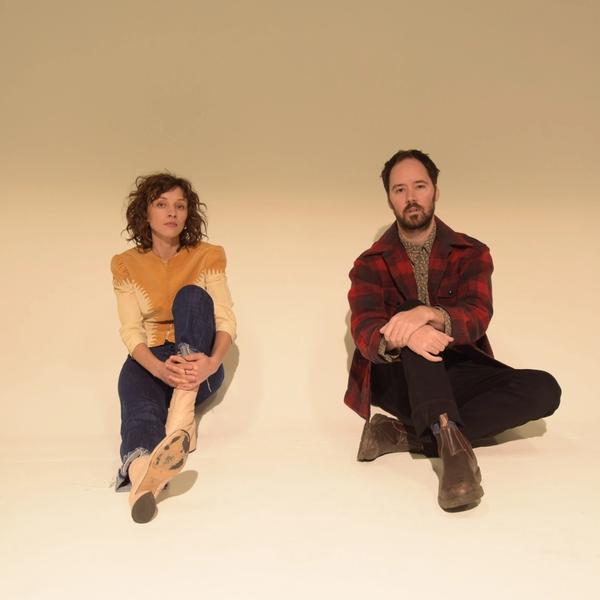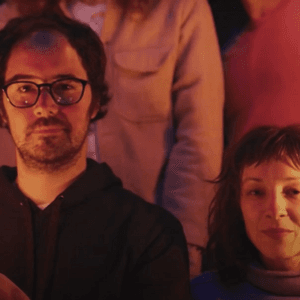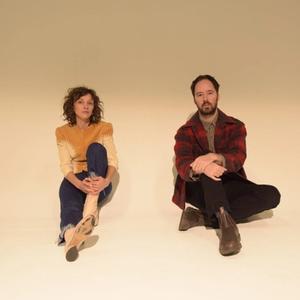




Link copied

What’s in a name? For a band, quite a lot. What to call a musical project — solo, group or otherwise — is a weighty decision, and sometimes that choice needs rethinking.
Typically, bands either change their name out of necessity (the Chicks and Lady A being two recent examples) or before fame restricts their options. It’s less common to see a band shift gears entirely, rather than start a side project that allows them to explore other avenues. Yet that’s the approach folk outfit Watchhouse took.
Andrew Marlin (vocals, mandolin, guitar, banjo) and Emily Frantz (vocals, fiddle) had long been feeling that their original name, Mandolin Orange, didn’t quite capture what they were doing creatively. When the pandemic brought everything to a halt, it seemed like an opportunity to think more carefully about their future. They’ll be the first to tell you that Watchhouse doesn’t signal a new beginning, as much as it does a realigning.
Their new self-titled album reflects a shining, though subtly constructed, hopefulness compared to their last as Mandolin Orange, 2019’s Tides of a Teardrop — an album that parsed grief, loss and the bittersweet pang of nostalgia.
Marlin and Frantz welcomed their firstborn daughter Ruby in 2018, and the inevitable transition her presence has generated bespatters Watchhouse. But the album doesn’t swing all the way into the light. Songs about parenthood ('New Star', 'Upside Down' and 'Lonely Love Affair') sit alongside observations about the effect of industrialization (‘Beautiful Flowers’) and even brief notes about our seductive digital lives (‘Better Way’). They are moments for Marlin, who serves as the band’s principal songwriter, to understand his own stance on such matters.
On Watchhouse, the arrangements are just as thoughtful, the lyricism as poignant. What hasn’t changed is the space that’s available within the band’s music. Watchhouse has long carved out breathing room for their musical ideas, but there’s an organic quality to that element now. Their sense of trust and ease with one another, and their music, has never sounded clearer.
Marlin and Frantz sit down to discuss the change into Watchhouse, how a lakeside scene inflected their standout instrumental song ‘Coming Down from Green Mountain’ and the hope Ruby brought with her when she arrived.
How many other names did you consider before landing on Watchhouse?
Emily: Not really a ton. It was a move that we had talked about for a long time. Over the last decade of making music together, we had this sort of disconnect with the band name. [Changing it] was never something we seriously considered because it didn’t feel like an option. Having been able to step away for so long because of the pandemic, it felt like this pressure cooker, so all of a sudden, we thought “We’re ready to do this”.
We felt like [the name] had to have some kind of meaning, and that one really clicked as soon as we started talking about it. Andrew has a song on one of his instrumental records he released this year called “The Watchhouse” that was inspired by the same place that we reference when talking about the new band name, so it felt like there was already a throughline there.
What direction does it symbolize for you?
Andrew: Forward. The same place we would hope Mandolin Orange did. We just didn’t want to call ourselves that anymore; we didn’t identify with Mandolin Orange anymore.
Emily: It’s hard for people on the receiving news of this. I think it’s really natural to want to see it as a signal of a change and new direction. It is sort of a new beginning in a superficial way, but for us it feels like the next step.
Watchhouse feels lighter and more spacious - not just in terms of the many instrumental moments you weave into the songs, but in the very recordings themselves. Was that purposeful?
Andrew: I think so. I want to make sure people get that this is basically a live record. It’s this band playing together in a room. I think a big part of how everyone in the group plays is with the very intention of leaving that space. It was less a conscious decision and more about allowing people to do what they naturally do in a song. With this album in particular, I feel like the band is really present.
Emily: I actually feel like this is the record where we were the least conscious about seeking that open space. We were really intentional about it on past records. It was really cool to hear how everyone in the band was really focused on their own role and what they needed to do in a given song, and how that left that space there in a natural and not contrived way.
Certain songs deal subtly with things like the environment (on ‘Beautiful Flowers’) and even the isolation and negativity that comes from our increasingly digital existence (on ‘Better Way’). How do you hope to wield your voice in addressing bigger issues moving forward?
Andrew: A lot of these songs are me trying to figure it out for myself, like “Where do I stand”? They’re conversation starters. I don’t feel like I’m diving I, getting too specific and pointing fingers at anybody, but I’m asking, “How does this stand in relation to my humanity? How does it stand in relation to the way I’m living in my day-to-day life?” Hopefully people take some positive things from that. If there’s some awareness to be gained there, great. If there are some not-so-positive feelings to be understood there, I don’t think it’s so specific that it isolates people.
Emily: As you can hear, listening to Andrew talk about this, these are really personal, introspective songs. I think they invite the listener to do the same. When someone’s listening to the songs, they may feel something about themselves, their life, their humanity and the way they interact with the world around them. Everyone can take something different from a given song or a lyric, but I think if the songs are inviting people to create the space for that kind of introspection, then that’s a positive.
‘Coming Down from Green Mountain’ is such a beautiful instrumental. How did it come together in the studio?
Andrew: I wrote that one at the end of a musical festival.
Which one?
Andrew: Green Mountain Bluegrass & Roots. It’s in Vermont.
Emily: It’s a small, relatively new festival that started a couple of years ago.
Andrew: It was a weekend full of playing with some of my favorite people to play with. When it came to an end, it had me feeling all these feelings - so I sat down at, like, 4 in the morning and wrote that tune. More and more, as I get older and dive deeper into the mandolin, I keep becoming more inspired by instrumental music.
I love how, especially on the recorded version, it sounds like we’re all searching. We ended up using the first take that we did. Josh Kaufman played the electric guitar on it, with Josh Oliver on acoustic, Clint on bass, Joe on drums, Emily on fiddle and me on mandolin. We all sat down and talked about where we wanted to go with it, but we kind of felt it out. I think we did two other takes after that first one, but that first one felt right. You can kind of hear Joe trying to figure out where his drumbeats are going to be. It’s evolving the whole time. I love that searching feel.
One of the reasons we ended up using that take is because, since we recorded it at this lake house, we had this beautiful view of the lake. During the first take, Josh Oliver starts getting this huge grin on his face. There were these two guys on a boat out on the lake and they caught this huge fish right in the middle of the take. We never stopped playing but we all looked out there, and we’re all smiling and silently cheering these guys on because they were so stoked to catch this big fish. We thought we have to keep this take now, because if not it’s the one that got away.
I’m amazed that you didn’t get distracted. When you’ve managed to capture such a specific searching feel on the recorded version of a song, how do you approach it live?
Andrew: Very often, you don’t even think about tempos when you kick off songs live, so that searching is always going to be there, especially when you add a crowd. There’s so much instability internally. I think that searching feel just comes naturally onstage.
It added some hope into our life because anytime you’re raising a kid, you’re thinking about the future. You’re trying to pave this path for this little one to grow up and hopefully in a positive way
It seems as though the birth of your daughter Ruby prompted a more hopeful songwriting turn. What was happening creatively in that moment?
Andrew: That was right at the end of some pretty full-on touring for us. I think having Ruby was a nice break from touring and some home time. It didn’t feel much like a break in the moment, but it was definitely an energy shift. It added some hope into our life because anytime you’re raising a kid, you’re thinking about the future. You’re trying to pave this path for this little one to grow up and hopefully in a positive way.
But stereotypically, a new baby can shift the amount of attention and energy you have to give to a partner. With your musical partnership, how do you prioritize that time as your focus elsewhere shifts?
Emily: The other stereotype about having kids, too, is that all of a sudden you don’t have any time to yourself. Finding time to be musically creative together is just having time for ourselves period, where one person isn’t covering for the other. That’s still current. It’s not something that we have totally figured out.
The song ‘Lonely Love Affair’ is such an interesting take on parenthood, with the daughter being a kind of stranger in the house. Where did that song spring from?
Andrew: It’s actually the opposite.
You guys are the strangers?
Andrew: We are. I can’t speak for Emily, but I can speak for myself. I felt like a stranger to myself after Ruby was born, because suddenly I had this whole new purpose in life and a whole new intention. It was almost like getting to know myself all over again. These moments where I was spending time with myself, suddenly it was hard to find a zone to write and to want to play what I was writing about because I wasn’t stepping away from my day-to-day; I was stepping away from this little being that required me to be there all the time, to keep it alive.
That was in the first week, I think, when I wrote ‘Lonely Love Affair’. There’s also a spiritual essence about that tune, where babies are the link between the real world and the spiritual world.
There’s this emotional part of holding your kid and watching her look around the room and smiling — I could imagine my late mom and my grandma leaning over my shoulder and her being able to see their spiritual presence, too.
I’ve heard that in Yoruba myths and other African storytelling traditions — how babies are still connected to the other plane of existence in the first few months of life.
Andrew: Totally. In thinking in those terms, I’d be staring at [Ruby] late at night. (I took the night shift.) She’d be looking around the room with her eyes and her mouth muscles would make her smile. Obviously, I know rationally that’s not a social cue, she’s not smiling. But there’s this emotional part of holding your kid and watching her look around the room and smiling — I could imagine my late mom and my grandma leaning over my shoulder and her being able to see their spiritual presence, too. I think there’s a lot of that wrapped up in that song as well. I think she was still connected to the spiritual world and in turn connected me to it as well.
Watchhouse's new self-titled album is released 8/13 via Tiptoe Tiger Music / Thirty Tigers. Watch the video for latest single 'Upside Down' below:





